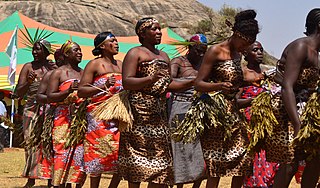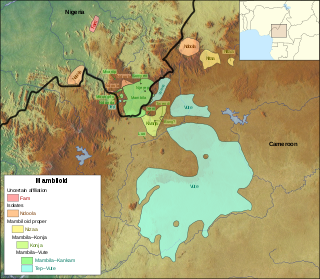Related Research Articles
Pan is an Afro-Asiatic dialect cluster spoken in Plateau State, Nigeria.
Mwaghavul is an Afro-Asiatic language spoken in Plateau State, Middle Belt Region of Nigeria.
Guduf-Gava is an Afro-Asiatic language spoken in Borno State, Nigeria. In a 2006 paper, Roger Blench classified Cineni as a dialect.

Ron is an Afro-Asiatic language cluster spoken in Plateau State, Nigeria. Dialects include Bokkos, Daffo-Mbar-Butura, Monguna. Blench (2006) considers these to be separate languages.
The Nupoid languages are a branch of Volta–Niger spoken in west-central Nigeria, particularly in southeastern Niger State and northern Kogi State. They include the Nupe, Gbagyi and Ebira languages, each with about 3 million speakers.

The twelve Mambiloid languages are a branch of Benue–Congo languages spoken by the Mambila and related peoples mostly in eastern Nigeria and in Cameroon. In Nigeria the largest group is Mambila. In Cameroon the largest group is Vute.
The South Plateau languages, also known as Jilic–Eggonic, are spoken in central Nigeria. Eggon has 150,000 speakers and Jili perhaps 100,000.
The four Beromic languages are a branch of the Plateau languages spoken in central Nigeria by approximately 1 million people.
The Yendang or Maya languages are a group of Adamawa languages spoken in Adamawa State, eastern Nigeria.
Ukaan is a poorly described Niger–Congo language or dialect cluster of uncertain affiliation. Roger Blench suspects, based on wordlists, that it might be closest to the (East) Benue–Congo languages. Blench (2012) states that "noun-classes and concord make it look Benue-Congo, but evidence is weak."
Alumu is a Plateau language spoken by approximately 7,000 people in Nassarawa State, Nigeria. It has lost the nominal affix system characteristic of the Niger–Congo family.
Ahwai, also called the Ndunic languages, is a Plateau language cluster spoken to the southwest of Fadan Karshi in Sanga LGA, Kaduna State, Nigeria. Most villages are located at the foot of the Ahwai Mountains in Kaduna State.
Adara, is a Plateau language of Nigeria. The name Adara is also used to refer to the ethnic group.
Izere is a dialect continuum of Plateau languages in Nigeria. According to Blench (2008), it is four languages, though Ethnologue does not distinguish NW and NE Izere. The Cen and Ganang varieties are spoken by only 2000 each. Cen has added Berom noun-class prefixes and consonant alternation to an Izere base.
Idun (Idũ), or Dũya, is a poorly attested Plateau language of Nigeria. Its classification is uncertain, but it may be closest to Ashe.
Bauchi is a cluster of Kainji languages spoken in Rafi, Nigeria LGA, Niger State, Nigeria.
Kakanda is a Nupoid language of Nigeria. Kakanda is spoken in and around Ega. There are scattered villages stretching from the Niger-Benue confluence to as far as Muregi. There are at least 10,000 people. It is most closely related to Gupa and Kupa, although there are also some similarities with Ebira.
Mvanip (Mvano), or Magu, is a minor Mambiloid language of Nigeria. Despite the small number of speakers, language use is vigorous. Ethnologue classifies Mvanip as threatened.
Lere is a nearly extinct Kainji dialect cluster of Nigeria. The ethnic population was cited as 16,000 in 2000, of whom only a few speak the language. A wordlist from the Takaya dialect can be found under External links.
Zora (Izora), or Cokoba (Cokobanci) in Hausa, is a Kainji language of Nigeria.
References
- ↑ Ndunda at Ethnologue (18th ed., 2015)
- ↑ Hammarström, Harald; Forkel, Robert; Haspelmath, Martin, eds. (2017). "Ndunda". Glottolog 3.0 . Jena, Germany: Max Planck Institute for the Science of Human History.
- ↑ Blench, Roger (2019). An Atlas of Nigerian Languages (4th ed.). Cambridge: Kay Williamson Educational Foundation.
| This article about Bantoid languages is a stub. You can help Wikipedia by expanding it. |